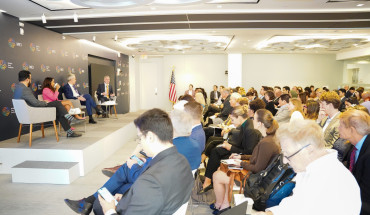The panel discussion "Reconstructing Afghanistan and Iraq" took place at the 59th annual conference in November, 2005.
Event Featuring:
David Mack, Larry Goodson, Ali Jalali, Samir Sumaidaie, Phebe Marr
Event Summary
Panelist Larry Goodson asserted that the United States lost almost two years on the economic reconstruction front because of the pressing priority to disrupt the Al Qaeda terrorist network and capture high value targets. Moreover, American government agencies were woefully unprepared for the complex challenges of nation-building in Afghanistan. They lacked the adequate institutional capacity to operate effectively in a non-permissive environment and country-specific individual knowledge. Despite some mixed progress in reforming the security sector, he warned that the window of opportunity for focus on Afghanistan is rapidly closing as tsunami and earthquake relief efforts divert scarce international resources and donor fatigue increases.
Former Afghan Interior Minister Ali Jalali highlighted the successful completion of the Bonn process with the adoption of a new constitution and the holding of presidential and parliamentary elections in Afghanistan, as well as the achievements in disarmament and demobilization. He warned, however, that progress in Afghanistan remains extremely fragile. The lack of capacity and the presence of alternative sources of power, both internal and external, prevent the central government in Kabul from extending its effective control to the periphery of the country.
According to Jalali, the exclusive focus on rebuilding the central government and the lack of perceptible progress on the local level has resulted in pervasive corruption and the development of patronage systems, which might compromise the nation-building efforts of the Untied States. He advocated a major shift of the development projects and the reallocation of a substantial portion of resources to different provinces.
Jalali insisted that the international community should devise a post-Bonn framework emphasizing a strategic and integrated approach in the reconstruction process that will reduce Afghanistan’s dependence on foreign aid and will make the country self-sustainable.
Iraqi Representative to the United Nations, Samir Sumaidaie, argued that Iraq had long democratic traditions dating back to Sumerian times and insisted that democracy could still thrive in the country even though years of misrule and oppression exacerbated the ethnic and sectarian divisions. He expressed confidence that, given the necessary constitutional tools and time, the Iraqi government can prevent the violent fragmentation of the country.
He warned against any premature pull-out of the US forces from Iraq and argued that it would precipitate a catastrophe, as the country would descend into chaos and turn into an incubator of various terrorist organizations. Yet, a mutually acceptable status of forces agreement between the Iraqi government and the United States is essential, since it will demonstrate that Iraq is a sovereign state. In order to avoid the violent disintegration of Iraq and help the central government to achieve stability, he said, the international community should try to ease the sectarian differences and restrain from presenting Iraq as a disparate mix of Kurds, Sunnis, and Shias. It should strive to promote secular powers instead, and strengthen the state and its capacity to deliver services and security to its citizens so they do not have to resort to clan or tribal allegiances for protection.
Scholar Phebe Marr emphasized the leadership gap in post-war Iraq and the monumental task of developing a new elite with a distinct Iraqi identity that can fill the void after the overthrow of the Baath regime. The poor security situation is the major factor preventing political groups from organizing a robust constituency; they therefore have to rely on ethnic and religious allegiances in order to garner support. To tackle this problem, she said the United States should turn its attention to the economic reconstruction of the country and foster political leaders with a new vision able to make compromises and build a civil society across sectarian lines.
Attributions
Ivaylo Gyurov, a graduate student in International Relations at the Maxwell School of Citizenship and Public Affairs of Syracuse University, wrote this summary.












